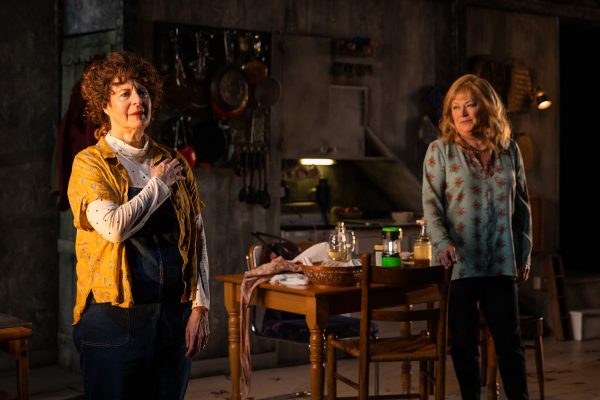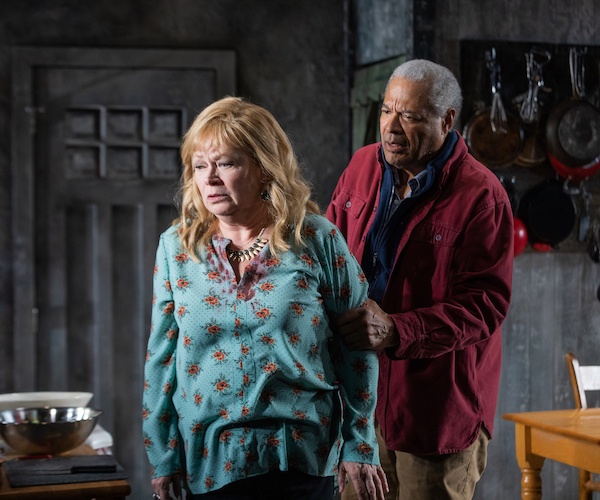Theater Review: “The Children” — After the Damage Has Been Done
By Robert Israel
An apocalyptic backdrop gives the play urgency, especially given the current worldwide struggle to contain the Covid-19 virus, which has already claimed thousands of lives.
The Children, by Lucy Kirkwood. Directed by Bryn Boice. Staged by SpeakEasy Stage Company, Boston Center for the Arts, Calderwood Pavilion, 539 Tremont St., Boston, MA, through March 28.

Paula Plum and Karen MacDonald in the SpeakEasy Stage production of The Children. Photo: Maggie Hall Photography.
The three characters that populate British playwright Lucy Kirkwood’s taut and grim one-act drama are gathered in a small cottage “on the east coast of England.” It’s a homespun place. There’s a knotty pine feel to it. As SpeakEasy Stage’s strong production opens, the sound of the surf just beyond the cottage is within earshot.
But there is nothing tranquil about the goings-on in the cottage on this summer’s evening. The three characters — two women and a man — all of them retired scientists — inform us that a “one-in-ten million fault sequence” has occurred. An earthquake triggered a tsunami and a local nuclear power plant has been flooded; unable to activate the pumps designed to cool the reactors down, radioactive poisoning has been released into the atmosphere. (The script mirrors the disastrous events that took place during the Fukushima nuclear power plant meltdown in Japan in 2011.)
This apocalyptic backdrop gives the play urgency, especially given the current worldwide struggle to contain the Covid-19 virus, which has already claimed thousands of lives. Disaster inevitably makes characters (particularly in the theater) ask probing questions, not only about an environment turned deadly, but also about their interpersonal relationships and, inevitably, their familial bonds. Robin (Tyrees Allen) and Hazel (Paula Plum) are married and are parents to four (unseen) adult children; former colleague Rose (Karen MacDonald) is childless.
The unseen offspring give the play its title: what will these adults, all three in their 60s and retired after having had meaningful careers, leave as their legacy to the next generation? A clue: the motif of the tsunami is a recurrent theme; it haunts the characters, and us, from opening until final curtain.
The sense of being overwhelmed and unprepared is prevalent. Can we ever really ready ourselves for unforeseen accidents? How useful is crisis preparation? The discussions about energy saving measures and how to prepare food (we see Hazel, always the efficient homemaker, scrub salad over and over again before serving it) are sad signs of very uncertain times. Because of the familiarity of the bonds the trio has shared, the intimacies (spoken and implied), Kirkwood supplies a bittersweet layer beneath the sadness. There is a sense of nostalgia, a longing to return to lighthearted moments of normality. Of course, they know this desire may never be fulfilled.

Karen MacDonald and Tyrees Allen in the SpeakEasy Stage production of The Children. Photo: Maggie Hall Photography.
Thankfully, there are lighthearted moments peppered throughout the production. Director Bryn Boice is attuned to the script’s nuances, and knows when to sprinkle bits of humor into what the Epistle of Jude calls “the blackness of darkness.” But be forewarned, this is a play that wards off sunshine. It commands us to drum up courage in the face of discomfort, dismay, dashed hopes, and nihilism. And if we lack the necessary resources, there are no ”empowerment” suggestions for where they might be found.
The three performers work masterfully with one another. As Hazel, Plum makes the most out of her character’s seemingly inane movements — folding an apron, carrying laundry up the back staircase — making us see how they reveal the tick-tocks of her inner life. Allen commands the stage, successfully coming off as as kind of life force, offering up glasses of homemade wine, sashaying across the cottage’s floor while dancing a lewd boogie-woogie with the two women. As Rose, MacDonald is at times cheeky, but she also takes on the earnest voice of moral duty, imploring her married friends to join her in efforts to reclaim a threatened world.
I traveled to Japan to interview those who weathered nuclear warfare in Hiroshima some years ago. The characters in The Children reminded me of these hibakusha, the survivors. My memories of these conversations have never left me — they are potent, indelible. And it is a testimony to this powerful script that now, as before, I was struck deeply by how fragile our lives are. And reminded that sleepwalking through our days is not an option.
Robert Israel, a contributing writer since 2013, can be reached at risrael_97@yahoo.com.
Tagged: Karen MacDonald, Paula Plum, Robert Israel, SpeakEasy Stage Company

Last summer’s production at Shakespeare & Company in Lenox, Massachusetts was excellent: https://artsfuse.org/186688/theater-review-the-children-scientists-under-pressure/